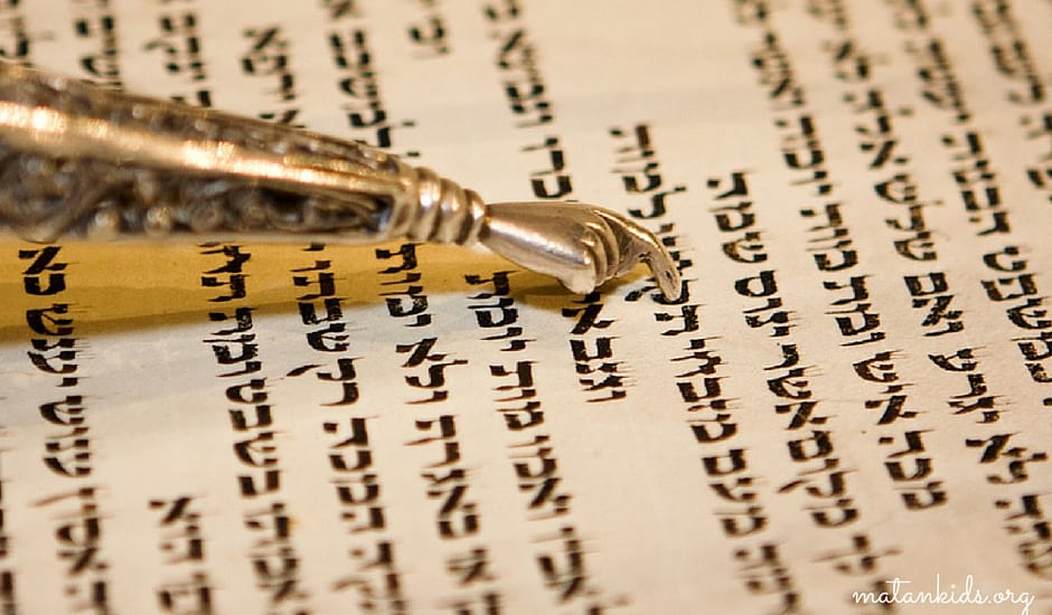We’re publishing a weekly series of articles covering each week’s Torah portion as a rabbi (such as the author) might do via a talk in a synagogue. The series is tailored so it may also be read by non-Jews who may be interested in how Jews read and interpret Scripture. Click here for the first article in the series.
——————–
Dëvar Torah — Parashath Emor (Leviticus XXI, 1-XXIV, 23)
And you will keep My commandments and you will perform them; I am Ha-Shem.
And you will not profane the name of My sanctity (lo thëchalëlu eth shém qodshi) and I shall be sanctified [vëniqdashti] among the sons of Israel; I, Ha-Shem sanctify you (mëqaddishchem) (XXII, 31-32).
The concept of sanctity, which we’ve been examining for the past couple of weeks, is again at issue here.
The language of the passage quoted above is interesting. Both verbs in the first verse and the first verb in the second verse are in the active voice, asserting things that the sons of Israel are or are not to do. We then suddenly encounter a passive form in the verb niqdashti, where — in the spirit of the first three — we should expect to find a positive affirmation in the form of vëqiddashtem eth shém qodshi, or something similar. Such a usage would be in keeping with the name assigned to this commandment in the Oral Torah, qiddush Ha-Shem (“sanctification of Ha-Shem”) as well as its antithesis, chillul Ha-Shem (“desceration of Ha-Shem”).
The Torah generally expresses the requirement to evince holiness in a passive form, most often with either the adjective qadosh (cf. e.g. Exodus XIX, 6; Leviticus XI, 44-45; XIX, 2; and XX, 7, 26, multa inter alia) or the reflexive form of the verb, vëhithqaddishtem, which can also be translated in a passive sense.
The Torah is at pains to tell us that Ha-Shem sanctifies us in the above passage and elsewhere. But despite the name associated with the commandment, it does not seem to identify a requirement that we actively “sanctify” G-d parallel to the warning in our passage against chillul Ha-Shem.
At the same time, it is interesting that the Holy Language does not possess an adjectival antonym to qadosh of the form chalol, which would be expressive of an ongoing state of profanation or desecration. So the balance is, in a sense, redressed.
The sharp-eyed reader with a living sense of the Hebrew language will have noticed that I translate the phrase shém qodshi with the very literal “name of My sanctity” rather than the more common “My holy name.” There are in fact two Hebrew words translatable by English as “sanctity” or “holiness.” Unlike the English words, which are complete synonyms of Latin and Anglo-Saxon derivation, respectively, the two Hebrew words, qëdusha and qodesh, are formed of the same root and have a subtle difference between them.
The first is an abstract noun which names the quality of sanctity. The second denotes an object, place, or institution which embodies or exudes holiness. It is in this sense that we speak of sacrificial foods as qodashim, or, indeed, of the heart of the Mishkan and later the Temple as the qodesh haqodashim — the “holy of holies.”
Here, too, we find a lack of an antonymous pair, just as with the word qadosh. Qodesh would seem to have an opposite number in the word chol, as implied in the blessing with which we end the sabbath, where we term G-d hamavdil bein qodesh lachol (“Who distinguishes between the sacred and the mundane”).
However, there is no abstract term similar to qëdusha. Why should that be?
The exhortation that Israel be holy is frequently tied to the qëdusha inherent in Ha-Shem.
Thus, in last week’s parasha we find Qëdoshim tihyu ki qadosh Ani Ha-Shem (“You will be holy for I, Ha-Shem, am holy,” [XIX, 2]) and again, Vihyithem li qëdoshim ki qadosh Ani Ha-Shem (“And you will be holy to Me, for I, Ha-Shem, am holy,” [XX,26]). Indeed, one of the most common appellations for Ha-Shem in the Oral Torah is Haqadosh Baruch Hu (“The Holy One, Blessed is He”). Even more telling is the Aramaic version of this name, Qudsha Bërich Hu, which uses the Aramaic equivalent of the word qodesh as opposed to the adjective (which would be qadisha in Aramaic).
From this description of Ha-Shem as “the Qodesh,” the embodiment and source of qëdusha, it would seem to follow that we can in no way “sanctify” Him. Our sanctifications of sabbath and holidays, or of sacrificial dedications, are performed in imitatione De-i, which, as we have seen, the Torah presents as the concept underlying the exhortation to be holy.
In the passage quoted above, however, the Torah does seem to suggest that we possess the negative capacity — that we can mëchallél Ha-Shem, “desecrate” Him, whatever that means. However, despite the evident existence of the capability (or else we would not be warned against it), there is no noun or adjective expressing the essential quality of “profaneness” or “state of desecration.”
While the concept of qëdusha exists, it seems its opposite number does not.
Since the words of the Holy Language serve to describe the ultimate reality of every part of Creation, this fact presumably can teach us something about this pair of opposites. But what is the lesson?
The commandment of qiddush Ha-Shem is codified in halacha as follows (Yoreh Dé‘a 157:1):
All of the transgressions in the Torah … if one says to a person that he should transgress them or be killed … and if he is in public, i.e. in the presence of ten Jews … he is required to be killed and not transgress; if the idolator intends to make him change religion … and if it is a time of persecution, even over changing the strap of a shoe, he should be killed and not transgress.
The commandment concerns the rejection of any attempt to force or persuade Jews to deny the existence of Ha-Shem and His Torah or His perfect, unique unity, even at the expense of life and limb. The Torah regards human life as a most vital and precious commodity, so much so that under most circumstances it mandates that one violate most of its provisions in order to save a life.
Qiddush Ha-Shem, then, is in a different class than most other positive commandments.
Reasonable people pray that they never have to perform it. It comes upon a Jewish individual or community only in extremis — when the level of chillul has reached the point that an extraordinary effort is needed to redress the balance:
The great 20th Century scholar Rabbi Ya‘aqov Kaminetsky, commenting on our parasha in his Emeth lëYa‘aqov, demonstrates just how extraordinary this commandment is. He notes that the 12th Century scholar Rabbi Moshe ben Maimon (known by his initials as Rambam, often called Maimonides in English) in his halachic formulation of the commandment (Hilchoth Yësodei haTorah, V, 1) writes:
The entire House of Israel are commanded concerning this great qiddush Ha-Shem.
From Psalms CXV, 12 we learn that the phrase “House of Israel” includes even children:
May He bless the House of Israel, the little ones with the adults.
Thus, in contradistinction to any other commandment, Rabbi Kaminetsky concludes that even minor children, obligated in no other commandment (since they are still being educated), are obligated in qiddush Ha-Shem.
How can this be?
He explains that — should martyrdom be decreed upon the parents — leaving behind small children possibly to be reared in an anti-Torah religion or ideology would be a vastly greater chillul Ha-Shem than that which occasioned the martyrdom in the first place.
He suggests that this consideration is what lies behind the many well-documented horror stories of Israel’s agonizing exile. Parents, faced with such a decree and seeing no way out, took the lives of their own children rather than leave them to such a fate.
It is through such sacrifices that the correction is made.
This is the point of the juxtaposition of our two verses, for the prescription to ward off the awful necessity of qiddush Ha-Shen in extremis is keeping and performing G-d’s commandments.
The midrash in Torath Kohanim, partially quoted by Rashi, tells us “that anything which is not continuously studied is not carried out.” Thus “keeping” the commandments requires a program of constant review to keep all of the details and ramifications sharp in one’s mind.
“An ignorant man is not pious,” the mishna informs us (Avoth II, 5), since he does not know how to conduct himself. It is only through constant review, “keeping” the Torah, that we can have some confidence of avoiding its profanation. Qiddush Ha-Shem then is the negation or avoidance of chillul Ha-Shem, or its correction in extremis.
Chillul Ha-Shem results from the absence of qëdusha in one’s life — a worthy consideration as we count down to the holiday of Shavu‘oth, the anniversary of the giving of the Torah.









Join the conversation as a VIP Member